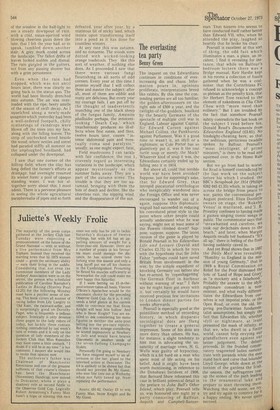The everlasting tea party
Benny Green
The inquest on the Edwardians continues in conditions of everincreasing din and chaos. Information pours in, opinions proliferate, interpretations breed like rabbits. By this time the contending parties are all too familiar; the golden-afternooners on the right side of E500 a year, and the twilight-of-the-godders, baulked by the ,beastly Germans of the spectacle of Multiple civil war in England, Labour against Capital, Sir Edward Carson against Michael Collins, the Pankhursts against Parliament. Was it a good time or wasn't it, an idyll or a nightmare; as Cole Porter has so plaintively put it, was it the real turtle soup or merely.. the Mock?
• Whatever kind of soup it was, the Edwardians certainly ended up by falling into it in 1914.
But above all, could that terrible world war have been avoided? Suppose, just for supposing's sake, that Sir Edward Grey, that intrepid piscatorial ornithologist who inexplicably wandered into the Foreign Office and was never encouraged to wander out of it again, suppose this diplomatic wagtail had succeeded in reducing his convoluted prose style to the point where other people could actually understand what he was saying, might not at least some of the Powers climbed down? Suppose, suppose, suppose. The latest version of the game is played by Ronald Pearsall in his Edwardian Life and Leisure (David an,d Charles 0.75) in which he toys with the hypothesis that Sir John Fisher "perhaps could have saved Britain from involvement in the war, by the simple expedient of knocking Germany out before she' has re-armed, by 'copenhagening' the German fleet in harbour without warning of war." I dare s.iv he might have got away with it, but certainly he would have received precious few invitations to London dinner parties for weeks afterwards.
Pearsall is especially good at the pointilliste method of recording history, in which disparate sociological dots are flung together to create a general impression. Some of his dots are more dotty than others, He has, for instance, a slight tendency to hint that in advocating the unsanctity of marriage vows, H. G. Wells was guilty of hypocrisy, which is a bit hard on a man who spent most of life acting on his belief. And it might have been worth Mentioning, in reference to the Denshawi Incident of 1906, that Bernard Shaw rehearsed this case in brilliant polemical detail in the preface to John Bull's Other Island, which play, Pearsall tells us, was honoured one night by a party consisting of Balfour, Asquith and Campbell-Banner
man. That bizarre trio seems to have conducted itself rather better than Edward VII, who, when he attended the play, laughed so heartily that he broke his chair.
Pearsall is excellent at this 'sort of thing, the odd fact which illuminates a man, a place, an incident. : find it revealing for instance, that while on Balfour's bedroom lectern there was a Bridge manual, Keir Hardie kept in his rooms a collection of fossils gathered when he was a coalminer, that the Corinthians FC refused to acknowledge a concept as plebian as the penalty kick, that Sir Herbert Tree reacted to the element of nakedness.in Chu Chin Chow with "more navel than millinery." But I am troubled by the fact that somehow Pearsall subtly contradicts the last book on the subject I read before his, Donald Read's Documents from Edwardian England (£3.65). No hindsight-cheating here, so that the seditious, pernicious twaddle spoken by Balfour, Pearsall's "most intelligent of prime ministers," is there to be read and squirmed over, in the Home Rule section.
But we go from bad to worse, for Read is himself contradicted bY the last work on the subject before his which I studied, the BBC's Scrapbook for 1914 (Philips 6382 045 E1.35) which, in taking us across the bridge from peace to war, paints the conventional pre' August postcard. Eliza Doolittle swears on stage, the 'RokebY Venus' is mutilated, ancl'1. B. Priestley confesses to having made a guinea singing comic songs in public. The commentator says that "strawhatted and carefree, we took our deckchairs down to the beach," and later, when Margot Asquith recalls her husband's "It's all up," there is feeling of the floor having suddenly caved in. And yet Read shows that in 1897 the Daily Mail was revealin.g. "Hostility to England is the mission of young Germany," that In 1909 a Royal Commission on Relief for the Poor dismissed the, lyric of 'Land of Hope and Glort as "a mockery and a falsehood. Probably the answer to the idyll' nightmare conundrum is nonexistent, and what really differentiates the Edwardians from ourselves is not imperial pride, or the Open Road, or even the old, lingering pre-Darwinian fundamentalist assumptions, but simply the fact that Edwardian life, whether idyll or nightmare, at least presented the mask of infinity, so that we, who dwell in a finite world, cannot help envying our grandfathers even against our better judgement. The debate proceeds. In the fronded conservatory teagowned ladies remons' trate with parasols while the Inerl stand back and curse that bounder Lloyd George, while down at the bottom of the gardens the Irish, the unions, the suffragettes tear up the stones of the path leading to the ornamental lake and prepare to start throwing then" Watching this odd scene, we try. try and try again to contrive for. It a happy ending. We never quae, succeed,


































 Previous page
Previous page